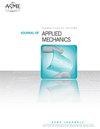Ti/Ni多层薄膜沉积温度诱导织构及强化
IF 2.8
4区 工程技术
Q2 MECHANICS
引用次数: 0
摘要
在沉积和随后的退火过程中,原位加热对Ti/Ni多层薄膜的微观结构和力学性能产生了强烈的热影响。在低温下沉积的薄膜显示出Ti和Ni层的优选结晶结构,柱状结构延伸穿过层。随着温度升高至300°C,柱状结构变得更加明显和完整,同时沿Ti/Ni界面发生更多的原子扩散和混合,促进了Ti-Ni金属间沉淀物的形成。高温沉积导致层状结构的分解。柱状Ti-Ni合金和进一步的再结晶合金被检测到具有优选的结晶织构。对于材料强度,即使与室温情况相比晶粒尺寸大得多,随着沉积温度的升高,也观察到硬度增加的趋势。此外,对于在低温下沉积的多层系统,后退火导致硬度更高,微观结构变化最小,在较低沉积温度的情况下观察到更多的强化。本文章由计算机程序翻译,如有差异,请以英文原文为准。
Deposition Temperature Induced Texture and Strengthening of Ti/Ni Multilayer Thin Films
Strong thermal effect on microstructure and mechanical properties of Ti/Ni multilayer thin films was observed from in-situ heating during deposition and subsequent annealing. Films deposited at low-temperature show preferred crystallographic texture for both Ti and Ni layers, with columnar structure extending through the layers. The columnar structure become more distinct and complete with the increase of temperature up to 300°C, and meanwhile more atomic diffusion and intermixing occur along the Ti/Ni interfaces, promoting the formation of Ti-Ni intermetallic precipitates. High-temperature deposition causes disintegration of the layered structure. Columnar Ti-Ni alloys and further recrystallized alloys were detected with preferred crystallographic texture. For material strength, an increased hardness trend is observed with increasing deposition temperature even with much larger grain size compared to room temperature case. Furthermore, for multilayer system deposited under low temperature, post annealing results in higher hardness with minimal microstructure modification, with more strengthening observed in lower deposition temperature case.
求助全文
通过发布文献求助,成功后即可免费获取论文全文。
去求助
来源期刊
CiteScore
4.80
自引率
3.80%
发文量
95
审稿时长
5.8 months
期刊介绍:
All areas of theoretical and applied mechanics including, but not limited to: Aerodynamics; Aeroelasticity; Biomechanics; Boundary layers; Composite materials; Computational mechanics; Constitutive modeling of materials; Dynamics; Elasticity; Experimental mechanics; Flow and fracture; Heat transport in fluid flows; Hydraulics; Impact; Internal flow; Mechanical properties of materials; Mechanics of shocks; Micromechanics; Nanomechanics; Plasticity; Stress analysis; Structures; Thermodynamics of materials and in flowing fluids; Thermo-mechanics; Turbulence; Vibration; Wave propagation

 求助内容:
求助内容: 应助结果提醒方式:
应助结果提醒方式:


